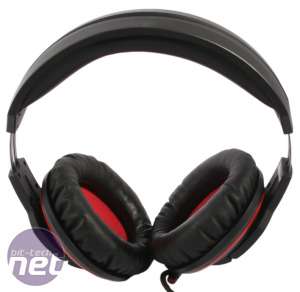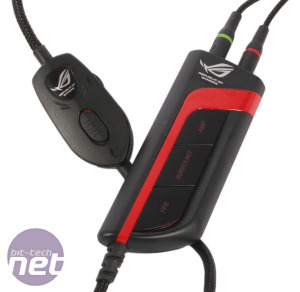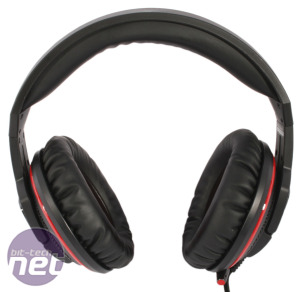
Asus ROG Orion Pro Review
Manufacturer: AsusUK Price (as reviewed): £79.99 (inc VAT)
US Price (as reviewed): Currently unavailable
Asus's Vulcan ANC remains our headset of choice here at bit-tech, thanks to its wonderful sound quality, comfort and competitive £80 price. As Asus's last foray into the world of gaming headsets was so successful, we were keen to see what the new Orion Pro could do, especially as the two headsets share the same price tag. Like the Vulcan, it's Republic of Gamers-branded and thus sports the traditional ROG red and black styling.
The two 100mm red and black earcups are connected by a padded headband, and sport the ROG insignia. The earcups can be adjusted along metal rails, with enough extension to cover most head sizes, although they cannot be folded inwards for portability. The clip-on in-line remote can be used to control the volume of the headphones and mute the retractable microphone housed in the left earcup.
The headset is fairly lightweight, much more so than the Vulcan, and thanks to the headband's leather-finished padding provides a snug fit, not an overly tight one. The earcups too provide a fit that's both comfortable and secure, and should be big enough to cover large ears. After prolonged use, our ears did relish the cooler air when we removed the headset, but we never found ourselves getting uncomfortable. The 30dB of passive noise cancellation provided is noticeable once you pop the Orion Pro off, but naturally it's nowhere near as effective as the Vulcan's active variety.
Having a retractable microphone is a bonus, but it's not as well implemented as in the SteelSeries Siberia v2, for example. Its flexibility is more limited than we anticipated, as it has a tendency to return to its initial position when you move it and feels a little flimsy too. Voice quality in calls, however, is fine, with no reported problems of excessive background noise. Strangely, Asus' Sidetone technology is active by default, meaning you can hear yourself through the headset when talking, but this can be muted in the Properties of the speakers.
The “Pro” in the headset's name isn't just a marketing ploy. Rather, it indicates that it comes with a ROG Spitfire USB soundcard, to which you simply connect the two 3.5mm audio jacks and then plug into an available USB port. However, even via a direct connection to the PC with the jacks, sound quality from the two 50mm neodymium drivers is pleasingly good. At every volume, sounds across the range are crisp and clear, with lower bass notes being distinguishable and high end sounds like hi-hats never dominating the overall effect.
The USB soundcard lacks software control, which does reduce your customisation options, but simplifies things too. Three buttons allow you to change the sound settings, with options for FPS, Surround and Amp (amplifier mode). By default, they're all active when you connect the headset, and it doesn't retain your settings between reconnections. You can choose to turn them on individually or in combinations, with red LEDs indicating the ones presently active. The additional wiring of the sound card leaves you with an annoying abundance of cabling to deal with, which the provided cable organizer only goes some way to helping with, as it's a rather fiddly affair.


Click to enlarge - The headset can be extended (left) and features an in-line controller and ROG Spitfire USB soundcard (right)
The volume limit increases noticeably in USB mode, although we kept our system volume lower than its maximum to remove the irritating background hiss that accompanies louder levels. The impressive sound quality is retained, and we particularly like the Amp mode, designed to complement the tonal performance of ROG headsets. Activating it injects some more life to sound, making games and music sound more dynamic. Meanwhile, the FPS EQ increases the mid-high range, which works nicely in games but is less pleasant in music. Surround mode implements 7.1 virtual surround, which although not the most convincing surround sound around, did cause us to gain slightly more increased positional awareness in games.
Conclusion
There's a lot to like about the Orion Pro headset. Importantly, sound quality is decent and it also provides a comfortable experience even in extended sessions. The USB sound processor is a great addition too, making the process of sound adjustment simple but mostly effective, although the lack of software customisation may be an irk for some. Your £80 will net you a very good headset, then, but the flimsy microphone, the lack of active noise cancellation and the superior sound quality of the equally priced Vulcan mean it remains the headset to buy.
-
Sound Quality36 / 40
-
Design25 / 30
-
Value24 / 30


MSI MPG Velox 100R Chassis Review
October 14 2021 | 15:04










Want to comment? Please log in.